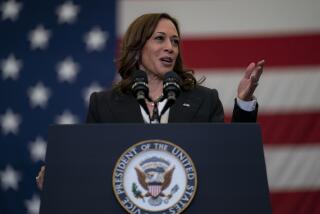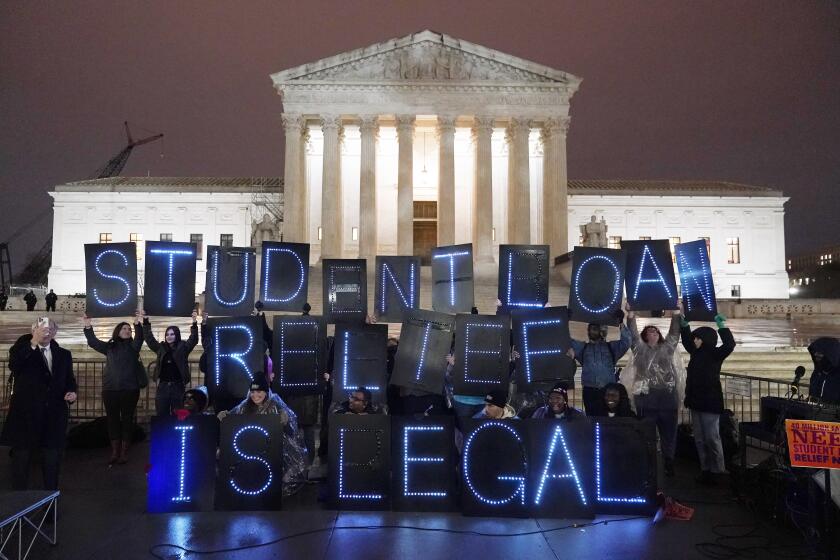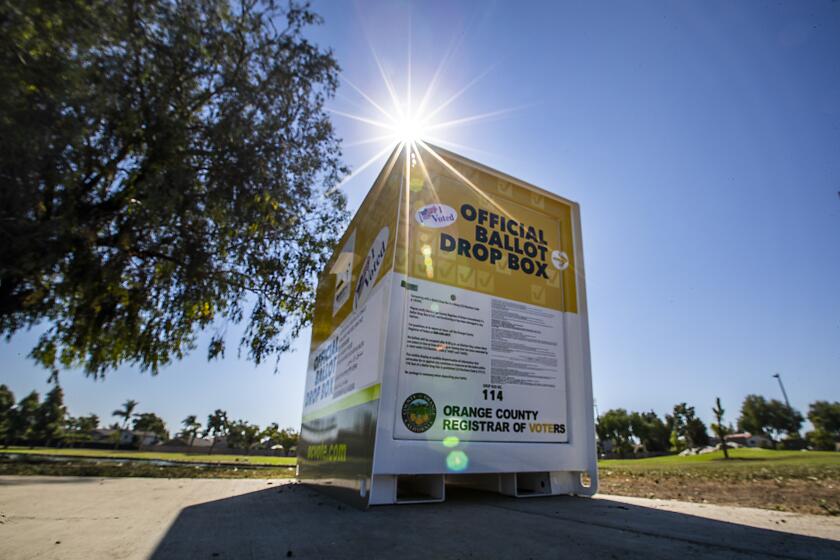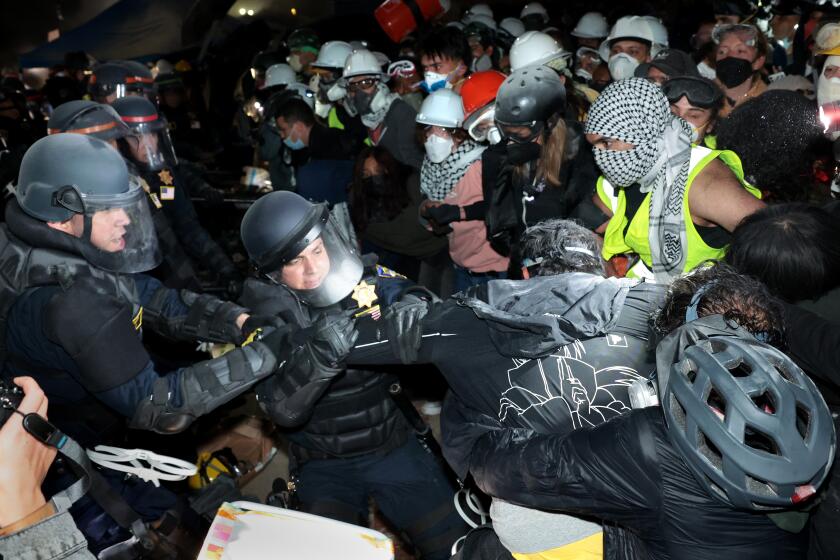5 Are Finalists to Head New USC Campus
California State University officials on Friday named the five finalists in the running to become the founding president of their new university in San Marcos.
The list included a psychologist, a physicist and a pianist who resigned as the chancellor of a small arts school, effective next month, under pressure from students, faculty and fellow administrators.
She is Jane Milley, 48, who had served as an arts adviser to CSU Chancellor W. Ann Reynolds in 1983-84 and since 1984 has been chancellor of the 750-student North Carolina School of the Arts in Winston-Salem. Her leadership there eventually earned the scorn of eight of her nine top administrators, who sent her a memo criticizing her management style.
Among complaints were assertions that she had discouraged advice from administrators, didn’t delegate tasks, had been abrasive to her staff and insensitive to the school’s supporters, and hadn’t demonstrated an understanding of the education of young artists.
Milley agreed April 27 to resign effective June 30 after C. D. (Dick) Spangler Jr., president of the University of North Carolina system, offered her a paid, six-month leave of absence and a three-year-contract as a faculty member in the music department. Milley, in the face of still continued protest by faculty and staff, told the Associated Press four weeks ago that she wouldn’t even return as a teacher.
“I’m going to pursue other professional opportunities,” she said.
Milley could not be reached Friday for comment.
All Top Administrators
The other four finalists now hold top jobs at public campuses ranging in student enrollment from 5,600 to 9,000. None now work within the California State University system, although Milley was dean of music at Cal State Long Beach before becoming an arts adviser to the CSU system and then leaving that job to become head of the North Carolina School of Arts.
The other four finalists come from campuses specializing in the liberal arts, general education and teaching preparation.
Besides Milley, the other four finalists, who were not ranked in preference by the search committee, are:
- Carol J. Guardo, president of Rhode Island College in Providence, R.I.
- Bill W. Stacy, president of Southeast Missouri State College at Cape Girardeau, Mo.
- Paul F. Weller, president of Framingham State College in Massachusetts, outside of Boston.
- Victor K. Wong, provost and vice chancellor for academic affairs at the Flint campus of the University of Michigan.
The job originally attracted 180 applicants, a list that was pared to 115 and then 15.
Caesar Naples, vice chancellor for faculty and staff relations for the CSU system and the staff executive leading the search for the president, said earlier this month that the field of candidates was “the largest showing of interest we’ve ever had for any of our presidencies.”
Chancellor Reynolds previously said: “The president of CSU San Marcos has to be a visionary with the intellectual, fiscal and people skills necessary to bring those visions to fruition. There aren’t many people who can measure up to such high expectations, but I’m confident our selection committee will find that one perfect woman or man to serve as the founding president.”
Neither Reynolds nor Naples could be reached for comment Friday. The announcement of the five finalists was made by the CSU’s public affairs office.
The search has focused on a review of resumes and daylong interviews of the semifinalists by the 13-member search committee.
Each of the five finalists will be further interviewed during the week of June 5 at the San Marcos campus site, a one-time chicken ranch that is expected to open to upper-division students only in the fall of 1992 as the 20th university within the California State University system and the first new university in the system in 20 years. By the fall of 1995, the campus will open to under-division students.
Background Checks
At the same time, CSU officials will conduct background checks of each of the finalists at their home campuses. Search committee members to date have acted only on the resumes and what they gleaned from the interviews with the candidates, and have not yet looked at independent background information on the finalists.
The CSU trustees will make their final selection when they meet in Long Beach June 13.
E. Nicholas Genovese, a professor of classics at San Diego State University who was on the selection committee, said: “I am pleased with the choices, based on what I know of them. It’s a good slate, and we should be able to find a good president from the bunch.”
He said the diversity among the candidates “just happened that way. We were very interested in individuals and their qualifications, with an understanding that people start off in certain disciplines, but if they are good academicians they learn about other disciplines along the way. You expect a person who is in one end of the spectrum to know the other end, if they are to be president.”
Nationwide Experience
Guardo, 50, earned her Ph.D. in psychology from the University of Denver and was a professor of psychology at Eastern Michigan University from 1966-1968 and at the University of Denver from 1968-1973. She was a college dean and professor of psychology at Syracuse State University in New York from 1973 to 1976, when she became dean of liberal arts and a psychology professor at Drake University in Des Moines, Iowa. From 1980 to 1985 she was a provost and professor of psychology at the University of Hartford in Connecticut, and has served as president of Rhode Island College since 1986.
Stacy, 50, earned a Ph.D. in speech communication from Southern Illinois University, and in 1971 returned to Southeast Missouri State University, where he earned his bachelor’s degree in education, to serve as a professor of speech communication. He stayed on the campus and rose to become dean of the school of graduate studies in 1976, becoming president of the university in 1979.
Weller, 53, earned a Ph.D. in inorganic chemistry from Cornell University in Ithaca, N.Y., and served from 1961-65 as a research chemist with IBM. In later years he held professorships in chemistry at the State University of New York in Fredonia, becoming chairman of the chemistry department in 1974. From 1975-79, he was the dean of arts and sciences and a chemistry professor at Western Illinois University. From 1979-1985 he was vice president for academic affairs at Cal Poly Pomona. He has been president of Framingham State College since 1985.
Wong earned his Ph.D. in physics at UC Berkeley and held a variety of teaching positions in physics at the University of Michigan at its Ann Arbor and Dearborn campuses. From 1980 to 1983 he was chairman of the department of natural sciences at Dearborn, and from 1983 to 1986 was dean of the college of arts, sciences and letters at Dearborn. Since 1986 he has been vice chancellor for academic affairs at the University of Michigan’s 5,600-student campus at Flint.
A Controversial Figure
If none of the candidates are famous, clearly the most controversial is Milley, who earned her Ph.D. in education administration from Syracuse State University after earning a master’s degree in music from Columbia University.
A pianist, Milley became a music instructor in 1967 at Elmira (N.Y.) College and was named director of the arts and science program there in 1974. In 1976-77 she was the administrative assistant to the dean of the college of arts and sciences at Syracuse, then spent three years as a dean in the humanities and fine arts division at Sacramento City College.
She was hired at Cal State Long Beach in 1980 as a professor of music and associate dean of the school of fine arts, and became the dean of the school in 1982. Milley transferred to the chancellor’s office as arts adviser in 1983, and left Long Beach for North Carolina the following year.
When she was hired as chancellor at the School of Arts, she became the first noncomposer ever to head the small college.
Public Vote of No-Confidence
Criticism of her managerial style began almost at once, but it intensified last fall with faculty, students and administrators publicly voicing their nearly unanimous lack of confidence in her administrative ability.
Student Body President Joshua Mark told reporters last month that Milley was “butting into everything where she doesn’t belong and undermining the deans.”
Even after Milley agreed last month to step down from her chancellorship and to become simply a teacher there, complaints continued about her continued presence on the campus.
Student musicians set up chairs and music stands in two of Milley’s three reserved parking spaces on campus where they gave impromptu performances, and some students wore T-shirts bearing a red circle and a slash through a likeness of the woman.
Finally, four weeks ago, Milley announced that she would not return to the campus in the fall, even as a faculty member.
“My decision was made on the basis of what I think is best for the institution and best for myself,” she told reporters at the time.
More to Read
Sign up for Essential California
The most important California stories and recommendations in your inbox every morning.
You may occasionally receive promotional content from the Los Angeles Times.






